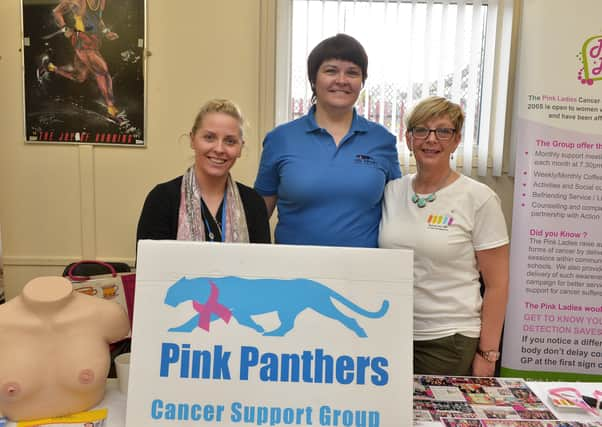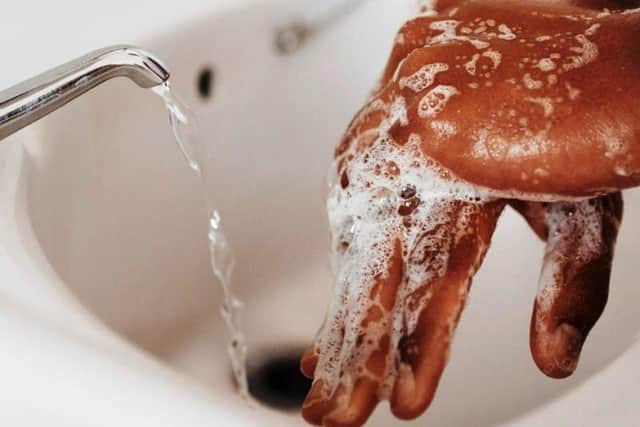Disinfectant overuse must be avoided during COVID crisis


Before we knew it, supermarket shelves were raided for those wee bottles of hand sanitisers that collected dust all year round, alongside every brand of bleach, disinfectants, and sanitising products.
We have nearly rubbed ourselves out from spraying, wiping, bleaching, disinfecting all in the name of protection from the virus.
Advertisement
Hide AdAdvertisement
Hide AdHowever, amidst all the headlines, there is a serious message emanating from The WHO European Centre for Environment and Health.


“Accidental chemical poisonings have surged amid the coronavirus pandemic as misinformation and heightened demand for sanitisers and disinfectants has led to inappropriate use” (Francesca Racioppi) WHO European centre for Environment and Health.
Joanna Tempowski, from WHO’s Department of Public Health and Environment (PHE), said that some people have been hospitalised after mixing cleaning products, for instance bleach combined with vinegar, resulting in the generation of toxic gases including chlorine.
This alongside the increase in skin irritation, eye irritation, and accidental poisoning of a child drinking out of small, unsecured bottles of sanitiser has highlighted the devastating effect of widespread overuse of toxic chemicals.
Advertisement
Hide AdAdvertisement
Hide AdWe seem to be of the mindset that, if a little disinfectant is good, a lot more will be better and that could not be further from the truth.
We are overusing and overdosing and while the short-term risk like eye irritation is apparent, the long-term overuse and the impact on the endocrine system could be devastating.
My job at the Pink Ladies has been to raise awareness and educate our members on the human impact of a group of chemicals called Endocrine Disrupting Chemicals or EDCs. These are chemicals that can alter hormone signalling.
The prevalence of these chemicals may have negative, and unpredictable effects on a range of body systems, including: thyroid function; nervous system; reproduction; or insulin function.
Advertisement
Hide AdAdvertisement
Hide AdThey also contain chemicals that can mimic the female hormone oestrogen.
They are found in many commercial cleaning products from detergents to cleaning sprays. Using these products could increase your exposure to EDCs, either by inhaling them, or getting them on your skin.
Look to avoid products containing them and be aware of what ingredients normal household products contain.
It cannot be said enough that simple HAND WASHING WITH SOAP, as often as possible is the safest most effective way of protecting you and your family from contracting the virus.
Advertisement
Hide AdAdvertisement
Hide AdWe would advise following these simple rules when choosing products for cleaning, sanitising, or disinfecting:
1 - Use fewer cleaning products in smaller amounts and less often. Regular cleaning with hot soap and water is normally enough for good household hygiene.
2 - Avoid household products with antimicrobial compounds such as triclosan or triclocarban.
3 - Choose products with official organic accreditation from organisations such as the Soil Association, which are more likely to be EDC-free.
Advertisement
Hide AdAdvertisement
Hide Ad4- Choose fragrance-free or naturally fragranced products such as essential oils and products without synthetic fragrances containing for example phthalates or synthetic musks such as tonalide.
5 - Look for paraben and phthalates-free products.
6 - Avoid bisphenols (BPA BPF and BPS) look for bisphenol-free.
7 - Look for plant based cleaners as they are less toxic and better environmentally eg Method/Ecover/ but choose fragrance free variety.
8 - Only use cleaning products in well-ventilated areas. Stand the recommended distance away when using cleaning products.
Advertisement
Hide AdAdvertisement
Hide Ad9 - Avoid using aerosol products that pollute the air (e.g. air fresheners).
10 - Make your own. Many websites have suggestions on how to make your own cleaning products. Many common store-cupboard ingredients can be used alone, or in combination, for a range of household applications.
Most cleaning projects can be tackled with nothing more than vinegar, baking soda, soap, and water.
In terms of Endocrine Disruptors, the most vulnerable groups to these chemicals are pregnant women, young children and immune compromised people.
Advertisement
Hide AdAdvertisement
Hide AdFor further information, please check out the following websites for great information on reducing your risk to chemical exposure.
https://www.env-health.org/
https://www.wecf.org/how-to-protect-yourself-your-baby-and-your-family-against-harmful-chemicals/